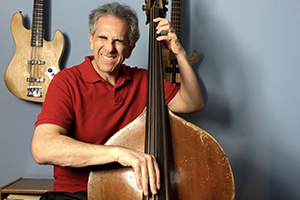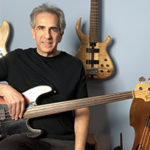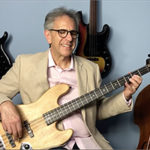How far can we push the boundaries of the instrument while staying true to our role?
By Jon Liebman
Week of November 25, 2019
If you’re not familiar with Miles Mosley, you need to check him out. He’s just about the most energetic bass player I’ve ever come across. While I’d seen him perform in the past, I’d never actually met him before we did our interview, published this week on FBPO. Miles definitely has some strong opinions about the role of the bass player in a band.
First off, he questions why the bass has traditionally been relegated to the background of the band, both literally and figuratively. Why shouldn’t the bass be on par with the rest of the band? Why can’t the bass be just as loud as all the other instruments? Or even louder? And why is the bass typically propped up at the back of the stage, behind the horn players?
Unable to find acceptable answers to his queries, Miles has always made sure his energy can be felt a mile away, whether he’s playing a walking line, or sawing away like nobody’s business with the bow. With his own band, The West Coast Get Down, he even switches up the proximity of the players, positioning himself front and center with his bass, situating the horns in the back.
So why does Miles buck the system like he does? And to what end?
“All I’m looking for is a fair shake at the intensity that I so admire,” he says, referring to what typically happens in a live jazz performance. “I want everybody playing as hard as I play behind them.”
When you think about it, he’s got a point. “We’re blazing through a tune and the drummer’s going wild, and the piano player’s bangin’ on it, and the trumpet player is screaming at the top of the mountain, and we’re all giving all this energy to your solo. When it comes to the bass player, I don’t get any harmony support or anything?”
After learning bass from Al McKibbon, John Clayton, and Ray Brown, three of the most revered bassists in the history of jazz, Miles began looking more critically at the role of the bass, determined to achieve “the same arc as a tenor solo, or a trumpet solo, or a guitar solo” when playing a bass solo. The energy level should remain constant, he says. “Even in a ballad, you don’t turn the energy down. You still play hard.”
An interesting approach, but it’s not for everyone. After all, when learning bass, we’re all taught that our job is to lay down the groove, keep good time, outline the harmony, and make the music feel good. In other words, it’s a supportive role. And Miles agrees with that description one hundred percent! The difference, though, is that he’s pushing the boundaries of what the bass is capable of doing, in a way in which he believes bass players are more deserving. Whether you call the bass a “background” instrument or a “supportive” instrument, Miles has found a way to inject boundless energy into that role, refusing to take a back seat to anyone.
Have a thought on the subject? Leave a comment below. I’d love to know what you think. In the meantime, check out my interview with Miles here.




